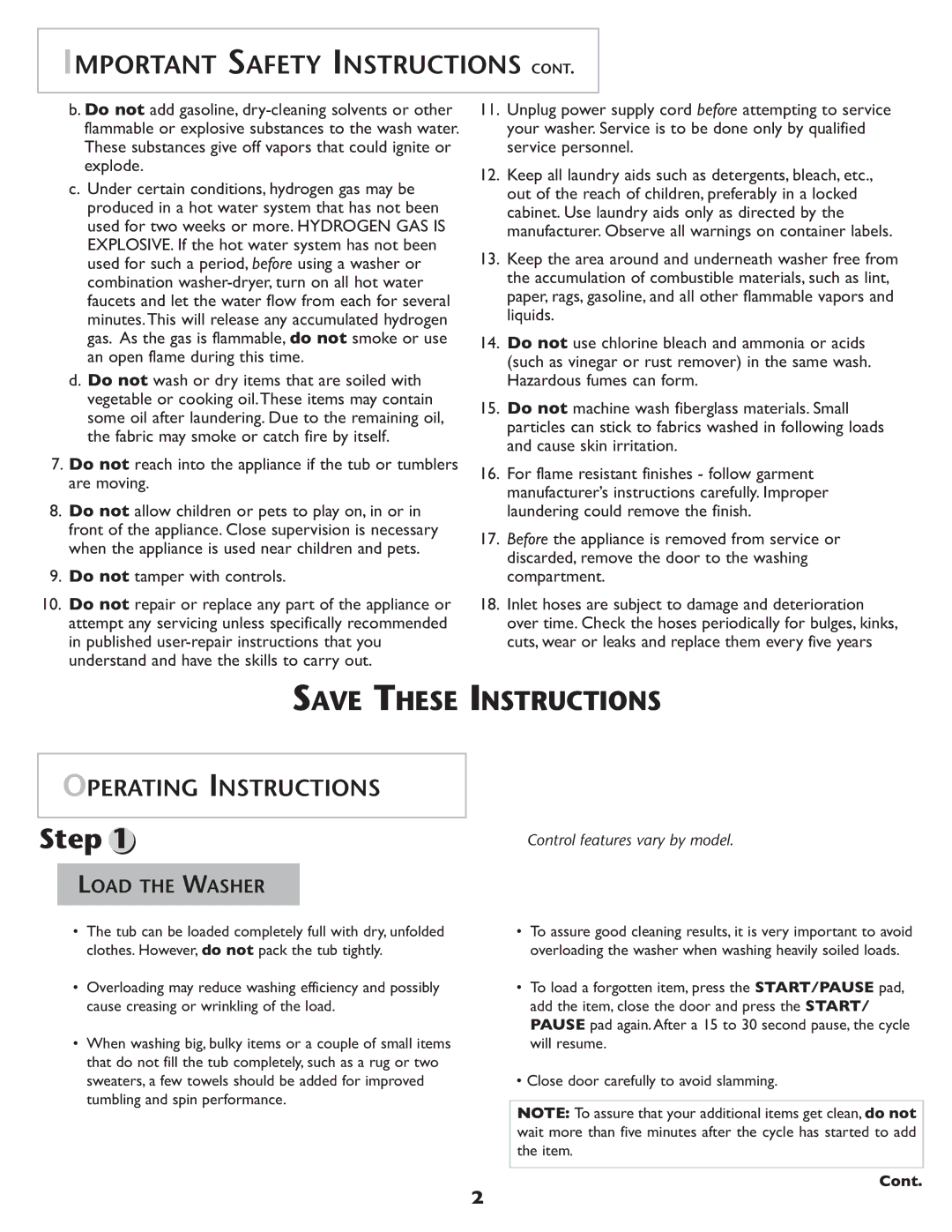
| IMPORTANT SAFETY INSTRUCTIONS CONT. |
| ||
|
|
|
| supply cord before attempting to service |
| b. Do not add gasoline, | 11. | Unplug power | |
| flammable or explosive substances to the wash water. |
| your washer. Service is to be done only by qualified | |
| These substances give off vapors that could ignite or | 12. | service personnel. | |
| explode. | Keep all laundry aids such as detergents, bleach, etc., | ||
| c. Under certain conditions, hydrogen gas may be |
| out of the reach of children, preferably in a locked | |
| produced in a hot water system that has not been |
| cabinet. Use laundry aids only as directed by the | |
| used for two weeks or more. HYDROGEN GAS IS |
| manufacturer. Observe all warnings on container labels. | |
| EXPLOSIVE. If the hot water system has not been | 13. | Keep the area around and underneath washer free from | |
| used for such a period, before using a washer or | |||
| combination |
| the accumulation of combustible materials, such as lint, | |
| faucets and let the water flow from each for several |
| paper, rags, gasoline, and all other flammable vapors and | |
| minutes.This will release any accumulated hydrogen | 14. | liquids. | |
| gas. As the gas is flammable, do not smoke or use | Do not use chlorine bleach and ammonia or acids | ||
| an open flame during this time. |
| (such as vinegar or rust remover) in the same wash. | |
| d. Do not wash or dry items that are soiled with | 15. | Hazardous fumes can form. | |
| vegetable or cooking oil.These items may contain | Do not machine wash fiberglass materials. Small | ||
| some oil after laundering. Due to the remaining oil, |
| particles can stick to fabrics washed in following loads | |
| the fabric may smoke or catch fire by itself. | 16. | and cause skin irritation. | |
7. Do not reach into the appliance if the tub or tumblers | For flame resistant finishes - follow garment | |||
| are moving. |
| manufacturer’s instructions carefully. Improper | |
8. Do not allow children or pets to play on, in or in | 17. | laundering could remove the finish. | ||
| front of the appliance. Close supervision is necessary | Before the appliance is removed from service or | ||
9. | when the appliance is used near children and pets. |
| discarded, remove the door to the washing | |
Do not tamper with controls. | 18. | compartment. | ||
10. | Do not repair or replace any part of the appliance or | Inlet hoses are subject to damage and deterioration | ||
| attempt any servicing unless specifically recommended |
| over time. Check the hoses periodically for bulges, kinks, | |
| in published |
| cuts, wear or leaks and replace them every five years | |
| understand and have the skills to carry out. |
|
|
|
SAVE THESE INSTRUCTIONS
OPERATING INSTRUCTIONS
Step 1
LOAD THE WASHER
Control features vary by model.
•The tub can be loaded completely full with dry, unfolded clothes. However, do not pack the tub tightly.
•Overloading may reduce washing efficiency and possibly cause creasing or wrinkling of the load.
•When washing big, bulky items or a couple of small items that do not fill the tub completely, such as a rug or two sweaters, a few towels should be added for improved tumbling and spin performance.
2
•To assure good cleaning results, it is very important to avoid overloading the washer when washing heavily soiled loads.
•To load a forgotten item, press the START/PAUSE pad, add the item, close the door and press the START/ PAUSE pad again. After a 15 to 30 second pause, the cycle will resume.
•Close door carefully to avoid slamming.
NOTE: To assure that your additional items get clean, do not wait more than five minutes after the cycle has started to add the item.
Cont.
